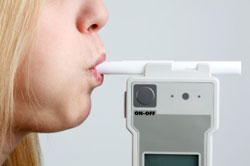Vermont DUI Breath Test
 |
In Vermont, the breath test is most often times the go-to method for determining a driver's Blood Alcohol Content (BAC) or level of intoxication. Created for convince and portability, the handheld device known as a Breathalyzer is a mechanism that drivers blow into for a BAC reading that will ultimately determine whether a driver is above the legal limit (.08) or not.
Why Are Breath Tests Used So Often?
While at times a variety of flaws have been found with the breath test, the results are widely trusted and recognized as trustworthy evidence against drunk drivers. If you are facing a DUI based on the results of a breath test, you will need representation from an experienced DUI who knows how to defend a failed breath test case.
Accuracy
As previously mentioned, the results of a breath test hold up fairly well in court and a failure should not be taken lightly. However, because they aren't as reliable as blood tests, there is room for debate for cases in which a driver blows close to the .08 limit.
Man Vs. Machine
The breathalyzer machine is widely used across the country by many law enforcement agencies and is considered the standard for DUI testing. But, that doesn't mean that it, like all machines, isn't subject to a certain level of error, misuse and/or malfunction.
In order for a breath test reading to be considered accurate in a court of law, the officer who administered the test must show proof that they have been properly trained. Additionally, all officers are required by law to keep a record of the maintenance and usage on the exact device they use. If either of these can not be proven, there is room to believe that the results were not accurate enough to prove guilt.
Other Problems With A Breath Test
How the officer administers the test and maintains the device is one thing, but there are also things that a driver might have unknowingly done to cause them to fail the test. The following are some of the reasons why those who are not intoxicated might have failed the test:
-Chewing gum, mints or mouth wash: Many of these products are known to have alcohol in them. If a driver has recently had any of these things in their mouth it could show up on a breathalyzer. While they are often only contain a very small amount of alcohol, it could be just enough to push a driver over the limit.
-Burping, vomiting, hiccuping: All of these naturally-occurring bodily functions could result in alcohol lingering in a driver's mouth. If a driver has done one of these things prior to taking a breath test, it could have an impact on the results.
-Chronic illnesses: Both chronic gum and mouth-related diseases as well as gastrointestinal diseases (like acid reflux) can have a great impact on how long alcohol stays in your mouth and can mislead a test into gauging a BAC much higher than it actually is.